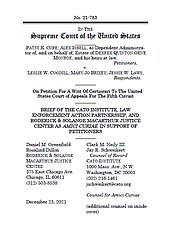Learn more about Cato’s Amicus Briefs Program.
Derrek Monroe, a pretrial detainee in a Texas jail, was placed on suicide watch after repeatedly attempting to strangle himself in his original cell. But prison officials – in contravention of jail policy, official training, and common sense – placed Monroe alone in a cell with a 30-inch phone cord, an obvious potential ligature. Then, Jessie Laws – the jailer on duty at the time – watched Monroe wrap that very cord around his neck, strangle himself, and become motionless. Laws neither intervened to stop the suicide nor called 911, and Monroe died from his injuries.
Monroe’s mother brought a Section 1983 suit against Laws and other prison officials, alleging that they acted with deliberate indifference to his wellbeing, both by placing him alone in a cell with an obvious ligature despite knowing he was a suicide risk, and by watching and failing to render aid as he strangled himself to death. A panel of the Fifth Circuit unanimously agreed that both acts of deliberate indifference amounted to a violation of Monroe’s constitutional rights, but a divided panel nevertheless granted qualified immunity to the prison officials on all counts because “[e]xisting case law … was not so clearly on point.” The dissent emphasized that both of these constitutional violations were so glaring and obvious that any reasonable officer should have realized such actions were unlawful, even without a case exactly on point.
The panel majority’s decision in this case reinforces a dangerous but widespread misunderstanding of how the doctrine of qualified immunity should apply in cases of obvious constitutional violations. Cato, joined by the Law Enforcement Action Partnership and MacArthur Justice Center, has therefore filed a brief in support of Monroe’s mother’s cert petition, urging the Supreme Court to summarily reverse the lower court. The Fifth Circuit in particular has been especially reluctant to heed the Supreme Court’s repeated instruction that, in the case of obvious constitutional violations, overcoming qualified immunity should not require a prior case with nearly identical facts. Indeed, the Fifth Circuit was rebuked for exactly such a mistake twice in the October 2020 term; in Taylor v. Riojas and McCoy v. Alamu, the Supreme Court vacated Fifth Circuit decisions that granted immunity to corrections officers who committed flagrantly obvious constitutional violations.
Even if the Supreme Court is unwilling to reconsider qualified immunity entirely, the doctrine’s legal deficiencies ought to make the Court especially vigilant about checking lower courts that allow erroneous expansions of the doctrine, thereby compounding a preexisting legal error. Ensuring that the Fifth Circuit does not continue to defy the Court’s case law is especially important today, at a time when public trust in our government institutions has fallen to record lows. By telling the public, in essence, that even obvious instances of official misconduct can go unremedied, the Fifth Circuit is not only misapplying the Court’s precedents—it is fueling a crisis of confidence in our nation’s law-enforcement officers.

This work is licensed under a Creative Commons Attribution-NonCommercial-ShareAlike 4.0 International License.


